MercoPress. South Atlantic News Agency
Tag: Inflation
-
Wednesday, April 11th 2018 - 09:11 UTC
March inflation in Brazil almost flat at 0.09%; Selic rate expected to be cut 25 extra points in May
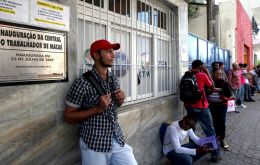
Brazil's monthly inflation rate slowed dramatically to a nine-month low in March, suggesting the central bank may have been too slow to signal another interest rate cut as the data continued to fall short of its inflation target.
-
Saturday, February 17th 2018 - 09:55 UTC
Argentine January inflation 1.8%; minister admits it is a slower pace than expected
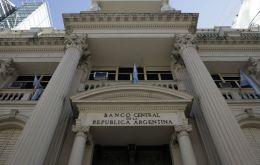
Argentina's Consumer Price Index (CPI) rose by 1.8% in January 2018, after increasing 3.1% in December 2017, said the country's statistics office Indec. Despite the deceleration, the reading was higher than market expectations for the monthly consumer price inflation (+1.5%). The result was primarily influenced by higher costs for entertainment and culture (+3.5%).
-
Friday, January 12th 2018 - 10:26 UTC
Brazilian inflation ends 2017 at 2.95%, below the bottom of central bank target
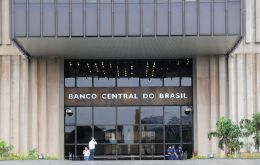
The annual inflation rate in Brazil increased to 2.95% in December, from 2.50% in November, rising above economists' projections of 2.80%, but ending the year below the bottom of the central bank's target for 2017, which ranged from 3% to 6%.
-
Friday, December 29th 2017 - 09:32 UTC
Argentina increases inflation targets for 2018/19, closer to private estimates

Argentina changed its inflation target for 2018 to 15%, up from the central bank’s previous goal of 8-12%, Treasury Minister Nicolas Dujovne said on Thursday, raising expectations for interest rate cuts. The government will postpone by one year its goal of lowering inflation to 5%, pushing it back to 2020, Dujovne said.
-
Thursday, March 13th 2014 - 08:14 UTC
Argentina's February inflation 4.3%, according to the Congressional index

Argentina's inflation during February reached 4.3%, according to the so called Congressional index, which is an average of private consultants and is released monthly by the opposition members from Lower House Freedom of Speech committee. This means inflation in the last twelve months in Argentina reached 34.8%.
-
Friday, December 27th 2013 - 04:52 UTC
Inflation in Argentine provinces expected to reach over 30% at the end of 2013

Consumer prices in the Argentine province of San Luis climbed 2.9% in November over October, 27.8% over December 2012 and 29.3% in the last twelve months, according to the provincial stats office. San Luis is ruled by dissidents from the ruling Peronist coalition headed by President Cristina Fernandez.
-
Wednesday, October 23rd 2013 - 16:24 UTC
Argentine consumers expect Inflation in the next twelve months to average 31.3%
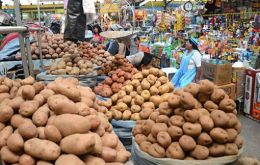
Expected inflation in Argentina for the next twelve months is on average 31.3% according to the monthly survey from the Torcuato Di Tella University, UTDT. However the monthly expectation dropped 1.6 percentage points compared to September in all regions of Argentina.
-
Thursday, August 15th 2013 - 03:37 UTC
Argentina July inflation 2.55% and 24.9% in twelve months, says congressional index

Argentina’s inflation according to the ‘congressional index’ reached 2.55% in July and 24.9% in the last twelve months was announced on Wednesday by members from the opposition in the Lower House.
-
Wednesday, February 20th 2013 - 06:01 UTC
Dissident labour unions challenge Argentine government anti-inflation and salaries policies
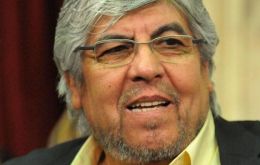
A major labour dispute is turning into an ugly conflict with the main Argentine dissident labour union challenging the government of President Cristina Fernandez and her latest policy of freezing supermarket prices for two months in a bold attempt to contain inflation.
-
Thursday, February 7th 2013 - 19:32 UTC
Bank of England next governor favours “flexible inflation targeting”

Bank of England has chosen not to inject any more money into the economy, leaving its quantitative easing (QE) programme at £375bn. The Bank also left interest rates unchanged at 0.5%.
